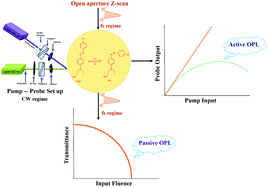Abstract
Two novel optical power limiters,

* Corresponding authors
a
Department of Physics, Sri Sathya Sai Institute of Higher Learning, Prashanti Nilayam, Andhra Pradesh, India
E-mail:
sivasankarasai@sssihl.edu.in
Tel: +91 9440826406
b
Department of Chemistry, Sri Sathya Sai Institute of Higher Learning, Prashanti Nilayam, Andhra Pradesh, India
E-mail:
gnageswararao@sssihl.edu.in
Tel: +91 949295462
Two novel optical power limiters,

 Please wait while we load your content...
Something went wrong. Try again?
Please wait while we load your content...
Something went wrong. Try again?
B. Rajashekar, S. Limbu, K. Aditya, G. Nageswara Rao and S. Siva Sankara Sai, Photochem. Photobiol. Sci., 2013, 12, 1780 DOI: 10.1039/C3PP50065A
To request permission to reproduce material from this article, please go to the Copyright Clearance Center request page.
If you are an author contributing to an RSC publication, you do not need to request permission provided correct acknowledgement is given.
If you are the author of this article, you do not need to request permission to reproduce figures and diagrams provided correct acknowledgement is given. If you want to reproduce the whole article in a third-party publication (excluding your thesis/dissertation for which permission is not required) please go to the Copyright Clearance Center request page.
Read more about how to correctly acknowledge RSC content.
 Fetching data from CrossRef.
Fetching data from CrossRef.
This may take some time to load.
Loading related content
